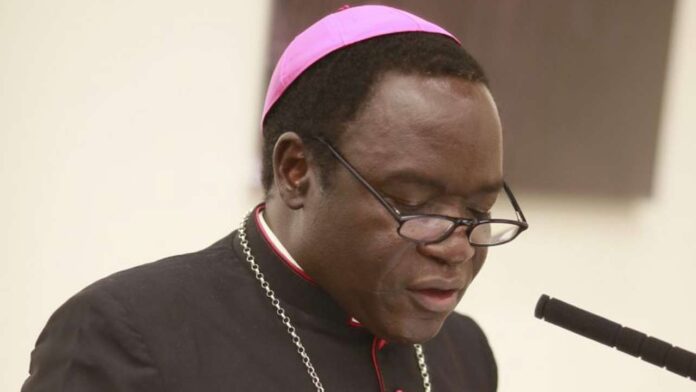FROM SUNDAY MATTHEW TAGGAH, KADUNA
In a heartfelt appeal at the launch of the Aid to the Church in Need (ACN) 2025 World Report on Religious Freedom in the World, Bishop Matthew Hassan Kukah of the Catholic Diocese of Sokoto cautioned against re-designating Nigeria as a “Country of Concern” on religious freedom. Instead, he called for greater international support to strengthen dialogue, rebuild trust, and consolidate recent gains in interfaith relations.
Delivering his remarks at the Augustinianum Hall in Vatican City, the outspoken cleric reflected on Nigeria’s complex religious landscape and the long shadow of violence that has afflicted communities across the country for more than a decade.
“For over 15 years, murderous gangs of Islamist and jihadist groups have found their way into our country, wreaking havoc, destroying lives and properties. Nigerians are dying for a living,” Kukah said.
The bishop acknowledged the grave security challenges Nigeria continues to face, describing vast areas of the country as “killing fields.” Yet he urged the international community to resist simplistic labels that obscure Nigeria’s deep interfaith ties.
Drawing on his experience as bishop in Sokoto— “right in the womb of Islam”—Kukah recounted moments of solidarity between Muslims and Christians, including his own ordination ceremony in 2011, during which the Sultan of Sokoto and Muslim friends played key roles.
“If we were dealing with outright persecution of Christians on grounds of identity, both myself and my small flock would not exist. Our daily lives should be defined by a better narrative,” he said.
While cautioning against mischaracterizing Nigeria’s turmoil as purely religious persecution, Bishop Kukah was unsparing in his critique of political failures that have enabled violence.
He described the administration of former President Muhammadu Buhari as “the worst phase in the history of interfaith relations,” accusing it of giving “oxygen to jihadists” through policies that favored northern Muslims.
“Under Buhari, to gain power, it was more important to be a northern Muslim than to be a citizen of Nigeria,” he charged.
By contrast, Kukah expressed cautious optimism about President Bola Tinubu’s leadership, noting what he called “confidence-building measures” — including religious diversity in key government appointments and visible gestures of empathy towards victims of violence.
While the ACN Report confirmed continuing attacks and discrimination against Christians, it also recorded a 37% decline in terrorist incidents in 2024, according to the Global Terrorism Index 2025. For Kukah, these improvements signal that Nigeria is at a fragile but hopeful turning point.
He warned that designating Nigeria a “Country of Concern” — a U.S. classification for nations that violate religious freedoms — could derail delicate interfaith initiatives.
Bishop Kukah also called on President Tinubu to challenge the adoption of Sharia law in twelve (12) Northern states, describing it as “unconstitutional” in a secular democracy. He urged the federal government to enforce equal rights for Christian minorities — from access to worship spaces to fair treatment in employment and education.

